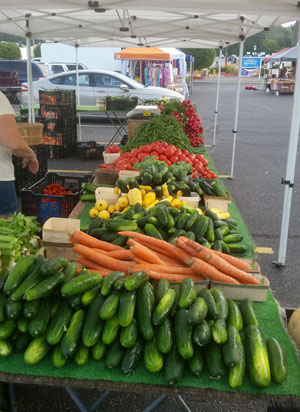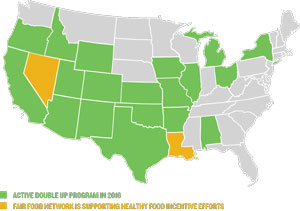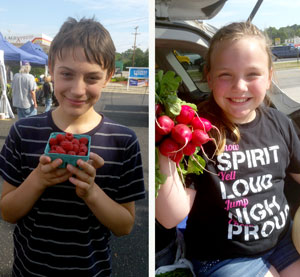Sep 21, 2016
Rural Farmers Market Promotes Food Security
by Allee Mead
We all know the health risks of eating too much food. The nation's newspapers are filled with reports about high cholesterol, diabetes, obesity, and early death. To combat these conditions, magazines encourage us to control portion sizes and to not eat every morsel on our plates. Yet 1 in 7 people in the United States struggles to put food on the table, much less control what amount of food is present.
Those suffering from food insecurity have little money for or access to food, particularly nutritious food. This can negatively affect their learning and development, family life, productivity, and physical and mental health.
Rural households seem to be hit especially hard by hunger – 23.6% of rural households with children were deemed food-insecure in 2014. According to Feeding America, a hunger-relief organization, counties labeled as Non-Metro or Rural account for 51.5% of all “High Food-Insecurity Rate Counties.”
The farmers market in Allegan, Michigan, is working to be a solution for the barriers that keep residents of this rural community from putting adequate amounts of healthy food on their tables.
Farmers Markets Keep It Fresh

The rapidly growing trend of farmers markets is proving to be a viable solution to providing food-insecure families – especially those living in rural communities without a grocery store – with fresh fruits and vegetables. In recent years, more and more markets are locating in rural areas and accepting benefits such as Supplemental Nutrition Assistance Program (SNAP).
For example, according to the Michigan Farmers Market Association (MIFMA), farmers markets in the state have more than tripled in the last sixteen years to total over 300 in 2015. In 2013 alone, SNAP participants redeemed over $1.2 million in benefits at Michigan farmers markets. Across the entire country, there are over 8,500 registered farmers markets.
Not only do farmers markets provide a more leisurely shopping and learning experience, but the produce is often better quality. Many fruits and vegetables lose key nutrients and antioxidants the longer they sit after being picked, and many grocery store finds are several days old by the time they're purchased. Farmers market finds, however, are often picked the night before or the morning of the market.
The USDA believes that farmers markets are a key resource in their effort to increase nutritious eating and fight food insecurity. According to Kevin Concannon, Under Secretary for Food, Nutrition, and Consumer Services, “Expanding access to fresh and nutritious food available at farmers markets and direct marketing farmers is a USDA priority. It's a key component of USDA's ongoing commitment to improving the diet and health of all Americans.”
A Local Solution
The Allegan Farmers Market began in 2001. The pop-up market has about 20 farmers selling their wares each week. For some vendors, this farmers market is their livelihood.

For some residents, the farmers market is not only a place to buy fresh produce but also an opportunity to socialize. One resident, Martha, attends so regularly that some vendors greet her dog, Sarge, by name.
And for some customers, the market is the easiest way to buy fruits and vegetables. “We have lots of U-pick farms in the area,” regular customer Kathy explains, “but not everyone is able to go out and do that.”
The Allegan Farmers Market has been proactive in implementing programs that help disadvantaged residents gain access to the fresh produce offered by their vendors. The farmers market accepts SNAP benefits, but it doesn't stop there. Thanks to a grant from the USDA Farmers Promotion Program, participants without transportation to the farmers market can receive rides from Allegan County Transportation. Kelsie King, Market Manager and Promotions Coordinator, says that this service has been well received.
“Everyone who has used the free transportation to our market has really enjoyed it and most have used their Bridge Cards,” King said. The name “Bridge Cards,” what Michiganders call the state's SNAP Electronic Benefits Transfer (EBT) cards, refers to the picture of Mackinac Bridge on each card.
Double the Dollars
In 2015, the Allegan Farmers Market joined a program called Double Up Food Bucks, which matches SNAP participants' spending up to $20 per day. So for every $2 spent on SNAP-eligible items at the market, participants receive a $2 Double Up token to use that day or later on any Michigan grown fruits and vegetables. These Food Bucks can be spent at any participating farmers market across Michigan, not just in the resident's hometown or county.
Double Up Food Bucks began in 2009 with five sites in Detroit, Michigan. Now in 150 locations across the state – 50 of which are in communities with populations under 20,000 – Double Up Food Bucks is funded by Fair Food Network, a nonprofit organization that works to develop solutions that support farmers while also increasing access to healthy food – especially in low-income communities.
This one-minute video by Fair Food Network gives an overview of the Double Up Food Bucks program:
“It's a win-win-win,” explains Emilie Engelhard, the Communications Director at Fair Food Network. “It helps customers bring home more fresh produce, it supports local farmers, and it supports the local economy by keeping money inside the community. Double Up is something that works in urban and suburban and rural communities and in all retail environments.”
According to a 2015 Fair Food Network survey, SNAP and Double Up Food Bucks helped rural Michigan's low-income families purchase nearly $300,000 worth of produce at farmers markets in 2014. This survey also reported that 90% of rural participants were eating more fruits and vegetables, and 68% were eating fewer chips, cookies, and candy, thanks to the program. In addition, 63% of vendors reported making more money while participating in Double Up.

In June 2016, the Double Up Food Bucks program was able to expand in nine states, thanks to $7 million from the U.S. Department of Agriculture National Institute of Food & Agriculture's Food Insecurity Nutrition Incentive (FINI) grants program. Nineteen states overall have active Double Up programs.
Food Security for Seniors
The Allegan Farmers Market also accepts vouchers from Senior Project FRESH, a program that helps qualifying seniors afford fresh fruits and vegetables. Anyone 65 years old or older who meets the program's threshold of 185% of federal poverty level or less qualifies for this program. Qualifying seniors who struggle with walking or traveling can send a proxy to a participating farmers market or roadside stand in their place.
Senior Project FRESH participants receive ten $2 vouchers to use at a farmers market in their county of residence. Like Double Up Food Bucks, these vouchers can only be used on Michigan-grown produce. After receiving their vouchers, participants receive nutrition education, so they can learn how to get the most nutrients from their purchases.
The program is funded by the U.S. Department of Agriculture as part of the Senior Farmers Market Nutrition Program and is free to customers and vendors.
Helping Moms and Kids Stay Healthy
In addition to supporting seniors, the Allegan Farmers Market also accepts coupons from WIC Project FRESH, helping women, infants, and children (WIC) who are nutritionally at risk. Celebrating its 30th year, WIC Project FRESH serves over 25,500 clients in 75 of Michigan's 83 counties.
Children up to age 5 and women – especially those pregnant or breastfeeding – qualify for WIC Project FRESH. Participants receive a $30 booklet (fifteen $2 coupons) to use during the farmers market season.
Like Senior Project FRESH and Double Up, the coupons are for produce that is grown in Michigan and unprocessed (so baked goods or canned items made with Michigan-grown produce are ineligible). Participants are especially encouraged to buy produce with high nutritional value, such as those rich in folic acid and vitamins A and C. Fourteen herbs are also eligible for purchase with the coupons.
Like their Senior Project FRESH counterparts, WIC Project FRESH participants receive nutrition education. WIC Project FRESH participants can enroll in classes from Michigan State University Extension (MSUE) that cover topics such as proper food storage and sanitation.
And for those who don't qualify for the assistance programs, the Allegan Farmers Market is still an important resource for promoting healthier eating. Farmers markets encourage children to try new fruits and vegetables, as they can learn about farming and gardening, receive free samples, and connect the fun experience of shopping around with healthy eating.

Kathy, an elementary school teacher, loves to take her grandchildren to the Allegan Farmers Market and give them each a few dollars to spend. Their favorite purchases are berries.
Kathy knows from her years of teaching that not all children have this same exposure to different fruits and vegetables. For a recent class party, she brought in a vegetable tray, made with produce from the Allegan Farmers Market, and some of her students asked what “those red things” were. Those red things were radishes.
The Allegan Farmers Market is playing a key role in helping local residents eat healthier and be healthier. As Engelhard puts it, “You can pay the farmer now instead of the doctor later.”

